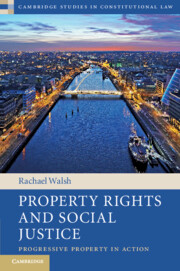Book contents
- Property Rights and Social Justice
- Cambridge Studies in Constitutional Law
- Property Rights and Social Justice
- Copyright page
- Dedication
- Contents
- Acknowledgements
- 1 Progressive Property in Action
- 2 Understanding Progressive Property
- 3 Property as Ideology, Individual Right, and Institution
- 4 Engaging Constitutional Property Rights
- 5 Standards of Review and the Form of Constitutional Property Rights
- 6 Adjudicating Fairness
- 7 Security of Possession in a Progressive Constitutional Context
- 8 Security of Value in a Progressive Constitutional Context
- 9 Learning from Progressive Property in Action
- Bibliography
- Cases
- Index
- Cambridge Studies in Constitutional Law (continued from page ii)
9 - Learning from Progressive Property in Action
Context, Complexity, and the Democratic Mediation of Property Rights and Social Justice
Published online by Cambridge University Press: 28 May 2021
- Property Rights and Social Justice
- Cambridge Studies in Constitutional Law
- Property Rights and Social Justice
- Copyright page
- Dedication
- Contents
- Acknowledgements
- 1 Progressive Property in Action
- 2 Understanding Progressive Property
- 3 Property as Ideology, Individual Right, and Institution
- 4 Engaging Constitutional Property Rights
- 5 Standards of Review and the Form of Constitutional Property Rights
- 6 Adjudicating Fairness
- 7 Security of Possession in a Progressive Constitutional Context
- 8 Security of Value in a Progressive Constitutional Context
- 9 Learning from Progressive Property in Action
- Bibliography
- Cases
- Index
- Cambridge Studies in Constitutional Law (continued from page ii)
Summary
This chapter synthesises the broad picture that emerges from Irish constitutional proeprty law about the mediation of property rights and social justice, and about the impact of progressively framed constitutional property guarantees on that mediation. It highlights the rewards for progressive property theory of doctrinal analysis and a wider comparative lens. Most fundamentally, it emphasises the political nature of constitutional property law in two ways. FIrst, judges gravitate away from innovative interpretation and application of ideas like social justice towards deference to the determinations of the elected branches of government. Second, constitutional property law can have political, and wider cultural effects, that do not reflect the strict legal effect of constitutional property rights as reflected in doctrine. It concludes that Irish constitutional property law demonstrates the challenges of implementing progressive property ideas in legal doctrine, but at the same time provides an illuminating example of a broadly coherent and effective attempt to implement a progressive constitutional structure for achieving partial resolutions of the tension betwene property rights and social justice.
Keywords
- Type
- Chapter
- Information
- Property Rights and Social JusticeProgressive Property in Action, pp. 235 - 268Publisher: Cambridge University PressPrint publication year: 2021



